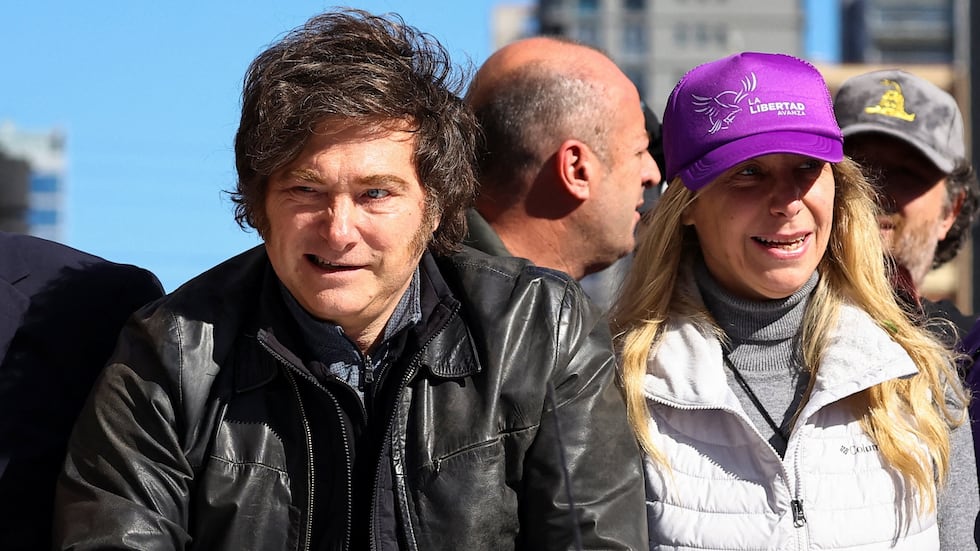Argentine government denounces illegal espionage operation carried out by ‘individuals linked to Russian intelligence services’ ahead of crucial midterm election.The Argentine government on Monday managed to halt the public release of audio recordings made inside the Casa Rosada, the presidential palace, presumably of Karina Milei, sister of President Javier Milei and a powerful figure within the far-right administration. A lower court judge warned that, due to their content, to which he has not had access, these recordings could affect “the privacy and honor” of the Chief of Staff and “the institutional security” of the country. In a parallel court filing, the government alleged that these recordings, as well as previous ones in which a now former senior official reveals an alleged internal corruption network, are part of an “illegal intelligence operation” aimed at “destabilizing” Argentina’s democracy. According to Security Minister Patricia
Bullrich, journalists and “people linked to Russian intelligence services with influence in Venezuela” are behind the plot.
The judicial onslaught was the first hint of a counterattack by the government after nearly two weeks in which Milei and his team lost control of the public agenda and seemed paralyzed. The crisis began with the publication on a streaming channel of conversations attributed to Diego Spagnuolo, Milei’s personal friend and then director of the National Agency for Disability (Andis). In the audio recordings, the official complained that he could not dismantle a bribery network set up in his office for medication purchases by the state. In the recordings, Spagnuolo told a trusted aide that the bribe money was going to Karina Milei and her main advisor, Eduardo Lule Menem. The government fired the official, rushed to denounce a setup by left-wing Kirchnerists, and began searching for the author of the recordings.
Last Thursday, on the campaign trail ahead of crucial midterm legislative elections to be held this Sunday in the province of Buenos Aires, Milei said he would bring Spagnuolo to justice because he was a liar. But reality moved faster than the president: on Friday, the same program that had published the audio recordings of Spagnuolo aired others in which Karina Milei herself appeared to encourage her staff to “remain united.” It was just a sample, innocuous in its content, but evidence that the Chief of Staff, who is also the president’s emotional support and the government’s chief strategist, had been recorded inside her office.
The power circles panicked. Karina Milei asked the courts to preemptively ban the publication of any future audio recordings, without even knowing if any exist. The federal judge who accepted her request, Alejandro Maraniello, insisted that this was not a case of prior censorship, although his decision has received mixed reviews. The lawyer Pedro Caminos, a member of the Civil Association of Constitutional Studies, warned that the judge did not have the audio recordings at his disposal and thus was not able to assess any potential damage to the honor of the president’s sister. He also noted that, according to Argentine law, “no authority has the power to prevent the dissemination of information.” “If such dissemination were to cause harm (such as an arbitrary interference with privacy), that is when liability arises. Always after the fact, never before, he wrote in a long post on X.
If the intention was to stop the scandal, Argentines are now more anxious than ever to hear the recordings that have so worried the government. And as collateral damage, any future release already has an official seal of legitimacy. The local press also highlighted the background of the judge who issued the ban. The Judicial Council, which oversees the performance of judges, has eight complaints against Marianello on file, five of them for sexual harassment of his employees. In September 2024, the Association of Judicial Employees succeeded in having a police officer stationed inside Marianello’s court to “protect” the staff.
As confusion spread, the Casa Rosada raised the specter of a major international espionage operation involving the Russian and Venezuelan secret services. According to presidential spokesman Manuel Adorni, “private conversations between Karina Milei and other officials were recorded, which were manipulated and disseminated to condition the Executive Branch. It wasn’t a leak; it was an illegal, planned, and targeted attack.” Minister Bullrich said, to support the idea of a foreign operation, that “parallel intelligence services try to destabilize governments that generate turmoil in the world of power,” governments like Milei’s, according to her view of events.
The local connections to this alleged operation are the journalists who published the audio recordings, whose homes the government requested be searched, as well as leaders linked to the Argentinos Football Association—which is at odds with Milei—and even the lawyer husband of a Libertarian congresswoman who recently broke with the Casa Rosada.
The audiotape scandal comes at a difficult time for the government. Economy Minister Luis Caputo is finding it increasingly difficult to maintain the exchange rate, which this Monday came dangerously close to 1,400 pesos per unit, the upper limit of the range that would force him, if he keeps his promise to the International Monetary Fund (IMF), to sell reserves to keep the peso alive. The economic instability has as yet unpredictable consequences for the electoral landscape. Local representatives and senators will be elected on Sunday in the province of Buenos Aires, a leftist stronghold, and Milei has little to offer voters beyond a reduction in inflation, which is at risk if the exchange rate ultimately soars.
The Spagnuolo audio recordings and the fear of leaks of conversations involving the president’s sister complicated matters. And Sunday brought more bad news. In the province of Corrientes, where a new governor was elected, Milei’s party, La Libertad Avanza (Liberty Advances), finished in fourth place after refusing to negotiate an alliance with the party that ultimately won more than 50% of the vote.



